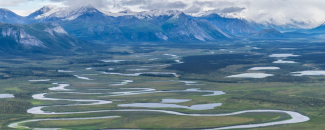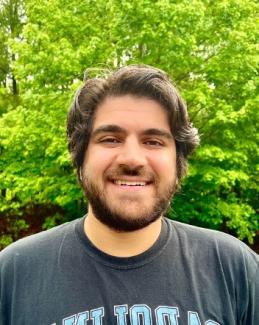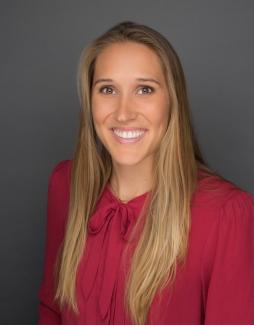Young scientists evaluate historical snow variables in order to understand snow conditions in a climatological context

NCEI continues its partnership with early-career scientists and university students with the NASA DEVELOP Program. At the DEVELOP location at NCEI, participants work on projects that focus on climate applications and incorporate NCEI climate data. The NCEI teams also partner with the National Integrated Drought Information System (NIDIS) to support projects each year. This spring, the team partnered with the US Fish and Wildlife Service and the Alaska Climate Adaptation Science Center in order to understand snow variability in a climatological context.
Northeast Alaska Climate Team
Northeast Alaska surrounds the largest national wildlife refuge in the country. It is home to much migratory and resident wildlife, but in recent decades, a warming climate has altered the landscape, allowing it to support dependent species.
The Northeast Alaska Climate team will analyze historical snow variables in the Arctic National Wildlife Refuge (ANWR) and neighboring National Petroleum Reserve to evaluate snow depth, normalized difference snow index (NDSI), snow cover, and snow water equivalent (SWE).
The team will create snow variability maps and time series analyses in order to help refuge managers track changes in snow conditions and prepare for ecological, cultural, and landscape impacts of changing snow behavior.
Omeed Arooji graduated from the University of North Carolina at Chapel Hill with a Bachelor of Science degree in Neuroscience, minoring in Chemistry and Biology. Alongside his studies, Arooji continues to work as a research assistant for the Cohen Lab at the UNC-CH School of Medicine. Throughout his time at the Cohen Lab, he has examined the role of environmental factors on TDP-43 (a DNA-binding protein) dysfunction under the mentorship of Dr. Giulia Fragola. Recently, he was awarded the 2022 Summer Undergraduate Research Fellowship and the 2022 Lindquist Undergraduate Research Award and is currently exploring the role of metal ions in ALS pathology. Arooji intends to practice medicine as a functional neurosurgeon and is currently diving into the medical field as a clinical scribe for UNC Neurology.
Tom Germann is currently a senior at The University of North Carolina Asheville, majoring in Environmental Studies-Earth Science. Having attended a liberal arts college, Germann brings a wide background in environmental sciences to this project-he has taken college classes in hydrology, GIS, soils, and ecology. Since January of 2022, he has worked at a water testing laboratory, running coliform and aquatic toxicity tests for hundreds of companies in the Southeast. Germann also runs Division I track for his university, in which he primarily races the mile and 800 meter. When Tom is not running, he is likely fixing a car, playing an instrument, shooting pictures, or listening to music.
Isabella Chittumuri joined the NASA DEVELOP National Program in the Fall of 2022. As a DEVELOP participant, she collaborated with an interdisciplinary team on a disaster project that evaluated the impacts of Hurricane Irma on Georgia Heir Property Owners using NASA earth observations. Chittumuri earned both her Bachelor of Arts and Master of Arts in Applied Mathematics and Statistics from CUNY Hunter College in New York City. During her academic career, she utilized the software programs Python and R to explore various data analysis methods such as machine learning, time series analysis, and multivariate analysis. Chittumuri has been interning with the Cold Climate Housing Research Center (CCHRC) at the National Renewable Energy Laboratory. Within CCHRC, Chittumuri also had the opportunity to conduct field work documenting data on housing issues that resulted from permafrost thaw in rural Alaska. In Fall 2023, Chittumuri will be starting her PhD in Applied Mathematics and Statistics at The Colorado School of Mines. In continuing her education, she hopes to deepen her knowledge of data analysis methods and its applicability to environmental and climate science research.
Kristin Anderson studied life sciences at Mercyhurst University in Erie, PA where she earned a Bachelor of Science in Biology, performed research in organic chemistry, and was a member of the Mercyhurst University Women’s Lacrosse team. She spent her summers working for Cornell Cooperative Extension Suffolk County to restore ecological diversity and natural resilience to coastal and nearshore habitats in Southampton, NY. Anderson then moved to South Florida where she worked in coral reef restoration, coral disease intervention, and benthic habitat reconnaissance. She continued her education at Nova Southeastern University, earning her Master of Science in Marine Science. Her research focused on the Florida Keys flats fishing community. There, she leveraged local stakeholder knowledge to build a geospatial model that promotes the sustainability of fishery resources by identifying key points of overlap between user groups. After graduation, she collaborated with Bonefish & Tarpon Trust, the Lower Keys Fishing Guides Association, and the Upper Keys Fishing Guides Association to support a set of stakeholder and science-based conservation zones for the Florida Keys National Marine Sanctuary Restoration Blueprint.







